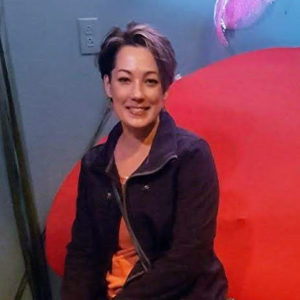I'd love to sleep, to really and truly sleep, but that is difficult because my body remembers and my brain won't relax.
By Liz DeBetta
My body remembers
the shiver of separation
the moment of release
from anything and everything I ever knew
My body remembers
the renunciation
the retraction
the ricochet
of loss
Pain becomes an echo of that loss
that thunders through my skull
screaming
Forcing me to remember what my body refuses to forget
Trauma lives in the body. When you don’t have words to remember, your body will store those memories in fascinating and complex ways. Being an adopted person means living with an overwhelming storehouse of anxiety and confusion that comes from being separated from the mother who carried you in her womb. The only safe place you ever knew is gone, and your baby brain learns to operate on hyper alert, constantly on the lookout for danger. Or, as I like to call it, always waiting for the other shoe to drop (or the shit to hit the fan). Suddenly you are untethered and adrift in a new world with strange sounds and sights and smells that don’t make sense except that you don’t yet have words for it so all of that fear gets locked inside and becomes a constant companion. I have lived with so much fear, so much anxiety, and so much confusion that it’s exhausting. I’d love to sleep, to really and truly sleep, but that is difficult because my body remembers and my brain won’t relax.
Breathe
Relax
It’s not real, it’s only a dream
But it feels real and I can’t separate from the feelings that bubble up while I sleep
I want sleep to be an oblivion
A place where I can just relax and breathe
A place where I can take a break from myself
Instead I sweat, cry, search —
for something
or someone
I never find
An endless pattern of up, down, into, through —
stairways
elevators
escalators
hallways
rooms
Desperately searching
Knowing that if I can find it
or you
I will be OK
I want to be OK
to breathe
to relax
to let go
So that when I wake up
I can be here
instead of stuck there
where I can’t find you
frantically wandering on the edge of panic
on the edge of despair
where reality is blurred by the darkness that still seems to threaten me
I have a recurring dream that is a manifestation of my fear and anxiety. It’s been happening for twenty years and it always makes me feel drained, panicked, and powerless. I wake up full of raw emotion, vulnerable and scared even though you are right next to me. Even though you are here and I am not alone. Every time it happens I’m less able to focus, less able to feel capable, less able to be present with you or anyone else. I have to struggle to find enough balance between what I know to be real and what, even though it feels so real, is only a dream. This recurrence is a reminder of how deeply embedded my fear of loss and separation is, a reminder of my terrified baby self who didn’t understand what had happened or why it was happening. This recurrence is what keeps me stuck in those preverbal memories that have such a strong hold on my inability to open up and express my feelings. How can I find the words to say how terrified I feel at the thought of losing you, or anyone I love? That losing you in the dream feels worse than death. It feels like I’m drowning in my own panic and I can’t stop moving because if I keep moving I might keep some of the panic at bay. If I keep moving I might get closer to finding you and then I can rest. So I spend most of my time waking and sleeping in a kind of constant motion to make myself feel safe. But I am safe and unsafe at the same time in this pattern and this constant tension creates a cage that I long to break free from. I have to fight my way back to feeling ok again in the aftermath of the dream because it haunts me and clings like a dark shadow refusing to let go. It makes me feel too much like I’m wearing my skin inside out. But these scars are invisible, only I can see and feel them. This is the stuff that love can’t fix.
Liz DeBetta is a PhD candidate in humanities and culture, Union Institute & University (certificates in Women’s and Gender Studies/Creative Writing); a lecturer of English at Utah Valley University; and the writing and performance mentor for Act Risk No More. A member of Actor’s Equity and SAG-AFTRA, she’s interested in performance-based narrative writing for healing and social change from a feminist perspective within the areas of adoption culture and reproductive justice as a way of disrupting dominant narratives and shifting paradigms for adoptees and birth mothers. Her writing has been published on “Dear Adoption.com” and in “#MeToo: Essays About How and Why This Happened, What it Means and How to Make Sure it Never Happens Again.” She’s a team facilitator of Adoptees Connect in Salt Lake City and is researching the benefits of creative writing to heal adoptee trauma.


